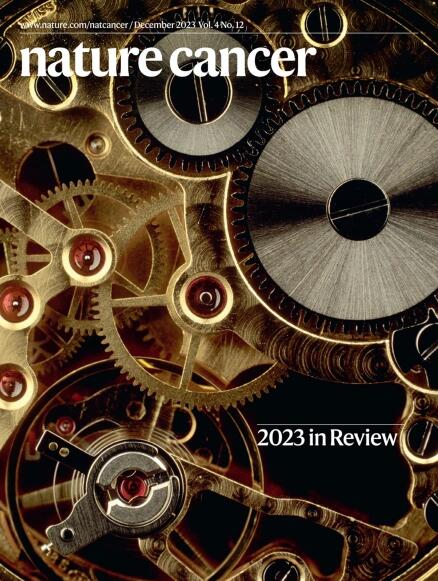中性粒细胞与肿瘤细胞相互作用形成促进乳腺癌侵袭性的信号利基。
IF 28.5
1区 医学
Q1 ONCOLOGY
引用次数: 0
摘要
多谱系通讯激活乳腺组织重塑和细胞可塑性然而,促进乳腺癌的动态信号仍不清楚。通过对乳腺发育和癌变过程中单细胞和物理相互作用细胞(PICs)的RNA测序,我们发现中性粒细胞在早期发育过程中短暂出现,并在晚期癌中与肿瘤细胞的物理相互作用中重新出现。中性粒细胞异质性分析表征了与年龄和癌症分期相关的转录状态。结合配体受体和PIC测序分析以及各种功能实验,揭示了一个物理和分泌的致瘤信号利基。该方法表明,中性粒细胞被肿瘤活化的巨噬细胞募集,并与肿瘤细胞物理相互作用,增加肿瘤细胞的增殖和侵袭性,以及内皮细胞的增殖和血管生成。中性粒细胞pics的分子程序上调与晚期乳腺癌患者的低生存率相关。我们相互作用驱动的观点强调了乳腺癌治疗的潜在分子靶点和生物标志物。本文章由计算机程序翻译,如有差异,请以英文原文为准。

Neutrophils physically interact with tumor cells to form a signaling niche promoting breast cancer aggressiveness
Tissue remodeling and cell plasticity in the mammary gland are activated by multilineage communications; however, the dynamic signaling promoting breast cancer remains unclear. Here, by RNA sequencing of single cells and physically interacting cells (PICs) along mammary gland development and carcinogenesis, we uncovered that neutrophils appear transiently during early development and re-emerge in physical interaction with tumor cells in advanced carcinoma. Neutrophil heterogeneity analysis characterized transcriptional states linked to age and cancer stage. Integrating ligand–receptor and PIC sequencing analyses with various functional experiments unveiled a physical and secreted protumorigenic signaling niche. This approach revealed that neutrophils are recruited by tumor-activated macrophages and physically interact with tumor cells, increasing tumor cell proliferative and invasive properties, as well as endothelial proliferation and angiogenesis. The molecular program upregulated in neutrophil-PICs correlates with lower survival in advanced breast cancer patients. Our interaction-driven perspective highlights potential molecular targets and biomarkers for breast cancer treatment. By integrating single-cell RNA and physically interacting cell sequencing analysis, here Cohen and colleagues report that neutrophils are enriched in physical crosstalk with breast tumor cells, promoting cancer aggressiveness.
求助全文
通过发布文献求助,成功后即可免费获取论文全文。
去求助
来源期刊

Nature cancer
Medicine-Oncology
CiteScore
31.10
自引率
1.80%
发文量
129
期刊介绍:
Cancer is a devastating disease responsible for millions of deaths worldwide. However, many of these deaths could be prevented with improved prevention and treatment strategies. To achieve this, it is crucial to focus on accurate diagnosis, effective treatment methods, and understanding the socioeconomic factors that influence cancer rates.
Nature Cancer aims to serve as a unique platform for sharing the latest advancements in cancer research across various scientific fields, encompassing life sciences, physical sciences, applied sciences, and social sciences. The journal is particularly interested in fundamental research that enhances our understanding of tumor development and progression, as well as research that translates this knowledge into clinical applications through innovative diagnostic and therapeutic approaches. Additionally, Nature Cancer welcomes clinical studies that inform cancer diagnosis, treatment, and prevention, along with contributions exploring the societal impact of cancer on a global scale.
In addition to publishing original research, Nature Cancer will feature Comments, Reviews, News & Views, Features, and Correspondence that hold significant value for the diverse field of cancer research.
 求助内容:
求助内容: 应助结果提醒方式:
应助结果提醒方式:


